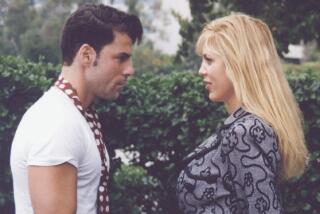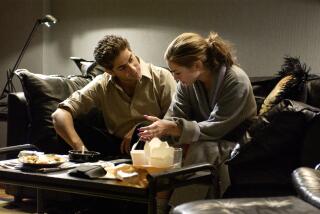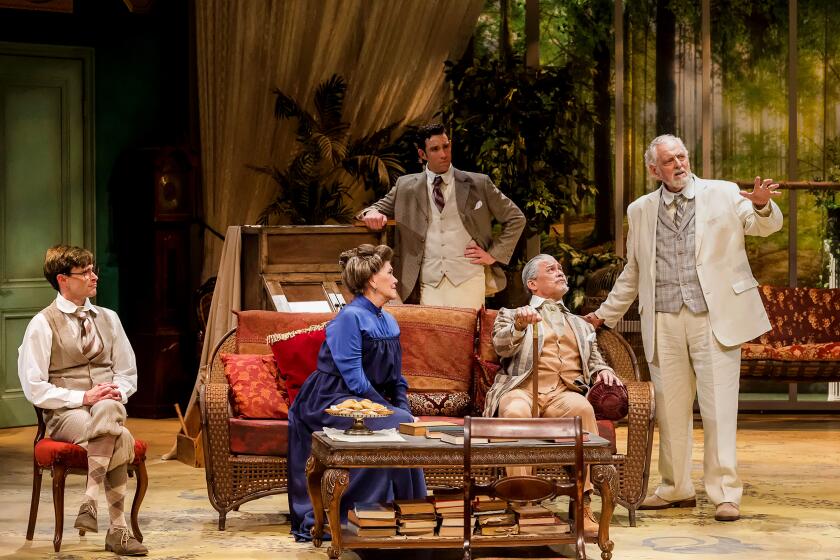Natural Born Leader : Opera: Conducting ‘The Rape of Lucretia’ is another stroke in a self-tutored career.
Christopher Keene didn’t wait for someone to teach him how to conduct. He just picked up a baton and started.
“The first time I ever conducted was in junior high school when I formed an orchestra of my friends to play Bach’s Brandenburg Concertos,” Keene explained.
The general director of New York City Opera offered this biographical tidbit between rehearsals of the San Diego Opera production of Benjamin Britten’s “The Rape of Lucretia,” which opens Saturday at Civic Theatre under Keene’s musical direction.
Britten’s tragic opera was another milestone in Keene’s self-tutored conducting career. It was the first opera the 19-year-old UC Berkeley undergraduate conducted in public after forming his own company to stage operas that interested him.
“There wasn’t anything going on then, except for San Francisco Opera. I was a coach and accompanist for a good number of voice teachers, and I knew many singers in the Bay Area. I did six productions while I was at the University of California. It was tremendous fun, and it didn’t cost any money because everyone got paid $50. I think the whole production budget for ‘Don Giovanni,’ which I both staged and conducted, was $3,500.”
Keene and his colleagues staged operas in the university’s Wheeler Auditorium until it burned down, then moved to the Pauley Ballroom and the Berkeley Playhouse. At Oakland’s Mills College,
he led the West Coast premiere of “Elegy for Young Lovers” by contemporary German composer Hans Werner Henze.
Keene’s rapid-fire repartee favors droll understatement. The hoopla over the Metropolitan Opera’s recent premiere of John Corigliano’s “The Ghosts of Versailles,” its first premiere in 25 years, left the 45-year-old impresario slightly exasperated.
“I never like to dampen anyone’s enthusiasm, but the degree of self-congratulation which has gone on about the Met--after a quarter of a century finally producing a piece they commissioned 12 years ago--is quite amusing to us.”
Keene’s observations sometimes conceal sharp criticism within their judicious framing. His explanation of why he attempts to do as much orchestral conducting along with his opera conducting is none too flattering about the standards of the opera pit.
“Symphony conducting keeps you honest musically in a way that opera doesn’t. With opera, there’s always a looseness and compromise in the coordination of the ensemble, which is intolerable in symphony work. It’s important to maintain your standards by being active in both areas. So I do as much guest symphony conducting as I can.”
Mounting adventurous operas during his UC Berkeley years built Keene’s reputation as a contemporary opera Wunderkind. It also brought him to the fledgling San Diego Opera company in 1967, when general director Walter Herbert was struggling to stage the American premiere of Henze’s sophisticated opera buffa parody “The Young Lord.”
“I was brought in at the last moment to play (piano for) rehearsals for ‘The Young Lord’ because nobody else could play the score. Walter Herbert called me up completely out of the blue when I was in San Francisco. He kept saying, ‘There’s nobody around here who can play the piece,’ but some of his singers said, ‘There’s this kid in San Francisco who can play all the modern scores.’ ”
Modern scores have been Keene’s calling card ever since. In 1986 at New York City Opera, he conducted the premiere of Anthony Davis’ “X (The Life and Times of Malcom X),” and two years later he was in the pit leading the premiere of Jay Reise’s “Rasputin.” When Keene became the company’s general director in 1989, he turned up the volume on contemporary opera. This season the ambitious company offered Bernd Alois Zimmermann’s apocalyptic Expressionist opera “Die Soldaten” and the American premiere of choreographer Bill T. Jones’ African dance opera “Mother of Three Sons.”
“There are pieces which do not sell, which I am still very excited about doing,” Keene explained. “Zimmermann’s ‘Die Soldaten,’ which we just did, is one. It played to very poor houses, despite enormous amounts of support from the press. On the other hand, Schoenberg’s ‘Moses und Aron’ (from the previous season) was a sellout.”
Although Keene has always been an advocate of Britten’s operas, he admitted that “The Rape of Lucretia,” the British composer’s 1946 retelling of a slice of pre-Christian Roman history, is a difficult work to categorize.
“It is an odd piece. It was the first of Britten’s experiments with reduced forces, trying to find a way to get opera around the country without schlepping a huge chorus and orchestra around. Secondly, the piece, with its Christian overlay, is very odd. In many ways, Britten never went back to that approach.”
Keene pulled no punches about the objections feminists will have to the opera’s libretto. In the opera, the rape victim commits suicide, and the guilty party, the Etruscan general Tarquinius, is not punished.
“It’s outrageously sexist, a piece of strong male chauvinism, exceedingly unacceptable to feminists. In history, the Etruscans are eventually overthrown. But with the libretto’s Christian viewpoint, the good guys suffer and the bad guys come off scot-free. Certainly the opera is about conflicting values, but it is a complex piece, difficult to understand.”
According to Keene, the opera’s importance is its musical score.
“The redeeming value of the piece is its beautiful music, wonderful scoring and extraordinary sonorities. Britten was a great specialist in the use of women’s voices, and the sounds of the four women’s voices in this piece--especially when they are used together--are astonishing. The drama is very compact and powerful, told in a straightforward way musically.”
Keene also found one additional asset in this opera.
“I get to play the piano in it as well as conduct.”
Performances of San Diego Opera’s “The Rape of Lucretia” are at 7 p.m. Saturday and March 3; 8 p.m. March 6; 2 p.m. March 8, and 7 p.m. March 11. Tickets $12 to $60. At Civic Theatre. Call 232-7636.
More to Read
The biggest entertainment stories
Get our big stories about Hollywood, film, television, music, arts, culture and more right in your inbox as soon as they publish.
You may occasionally receive promotional content from the Los Angeles Times.






